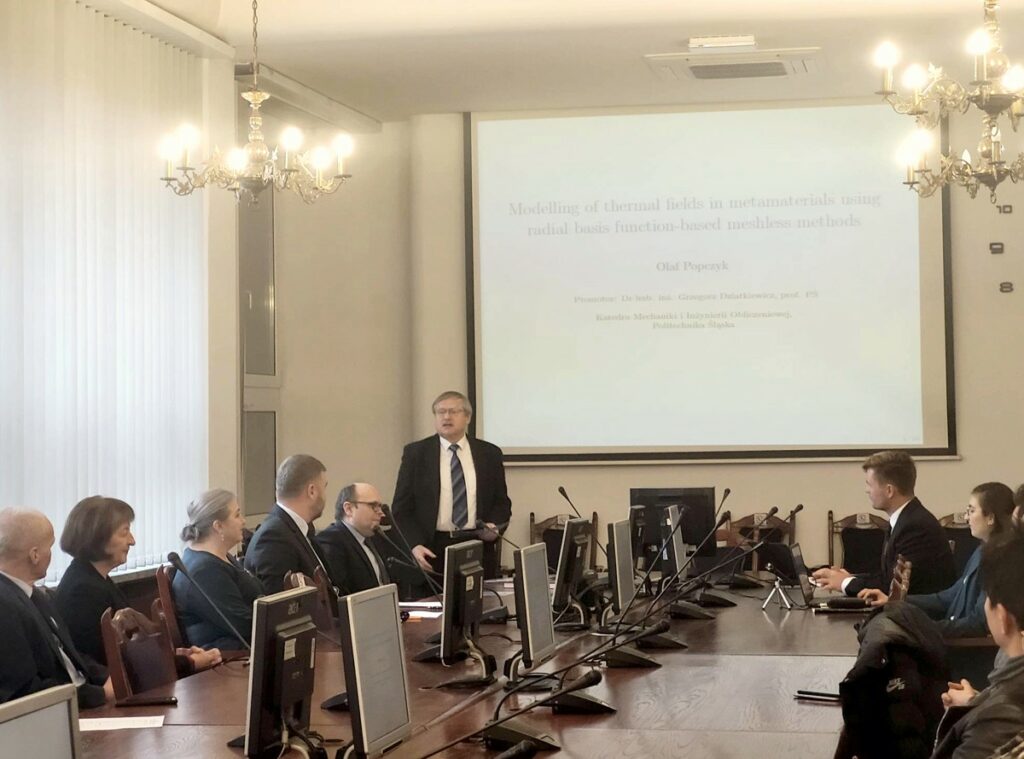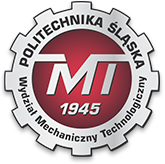On December 5, 2022, the final exam (dissertation defense) of doctoral thesis of Olaf Popczyk, M.Sc., entitled. “Modelling of thermal fields in metamaterials using radial basis function-based meshless methods“. The thesis was supervised by Prof. Grzegorz Dziatkiewicz, while the reviewers were Prof. Liliana Rybarska-Rusinek from Rzeszów University of Technology and Prof. Tomasz Domański from Częstochowa University of Technology. The Doctoral Committee has approved requests to the Council of the Discipline of Mechanical Engineering to grant Olaf Popczyk, M.Sc., the degree of Doctor of Technical Sciences in the discipline of Mechanical Engineering, and to honor his dissertation.

Heat flow is one of the most fundamental and common phenomena in nature, which makes it one of the most intensively used phenomena by a mankind. Nevertheless, due to the significant dissipative nature of heat flow, many very promising applications of this phenomenon remain in the realm of research and discussion. If the dissipative nature of the heat flow could be overcome and the heat flow could be manipulated, thermal cloaking or shielding could be performed, as well as inversion or concentration of the heat flow. It would open up great opportunities in science, industry, military and many other fields. For hundreds of years, manipulation of the heat flux was unattainable until the appearance of thermal metamaterials, which, thanks to their structure, characterized by a strong spatial variability of thermophysical parameters, made it possible to fulfill the dream of controlling the heat flux. This is the driving force behind research like this. The complex structure of metamaterials requires advanced methods for their analysis. For many methods, it is not entirely clear if they are suitable for this. This thesis decided to check whether the radial basis function-based Kansa method is suitable for this purpose. As part of the research, heat conduction problems in a material with spatially variable distributions of thermophysical parameters were investigated. The study considered the coefficient and pseudo spectral formulation of the non-symmetric Kansa’s method for solving elliptic, parabolic and hyperbolic problems. For the time-dependent problems, two approaches were used: the method of lines combined with the time integration schemes known from the structural dynamics and the spacetime approach in which time is treated as a coordinate. An extensive study of the applicability of the Kansa method has been conducted for various combinations of the above approaches for one and two-dimensional problems. The thesis proposes a group of algorithms for finding a good value of the multiquadric radial basis function shape parameter, one of the most important research problems within the radial basis function-based methods for solving partial differential equations. The work also carried out the process of designing a thermal metamaterial device for heat flux inversion and concentration as well as thermal shielding and cloaking using gradient optimization. The thesis shows that the Kansa method is suitable for solving the considered class of problems for most combinations of the aforementioned approaches. The spacetime approach has worked only for some of the problems considered in the work. It is worth noting that this approach, despite its enormous potential, does not receive wide attention from the scientific community, which makes it an interesting topic for further research. The proposed group of algorithms for finding a good shape parameter value turned out to be very effective for the considered class of problems. Designing a thermal metamaterial device was not successful in the case of inversion, the desired effect was not achieved, however, it is an extremely demanding case from a numerical point of view, and it is certainly a good direction for further research. On the other hand, designing was successful in three other cases of the heat flux manipulation: shielding, cloaking and concentration.










